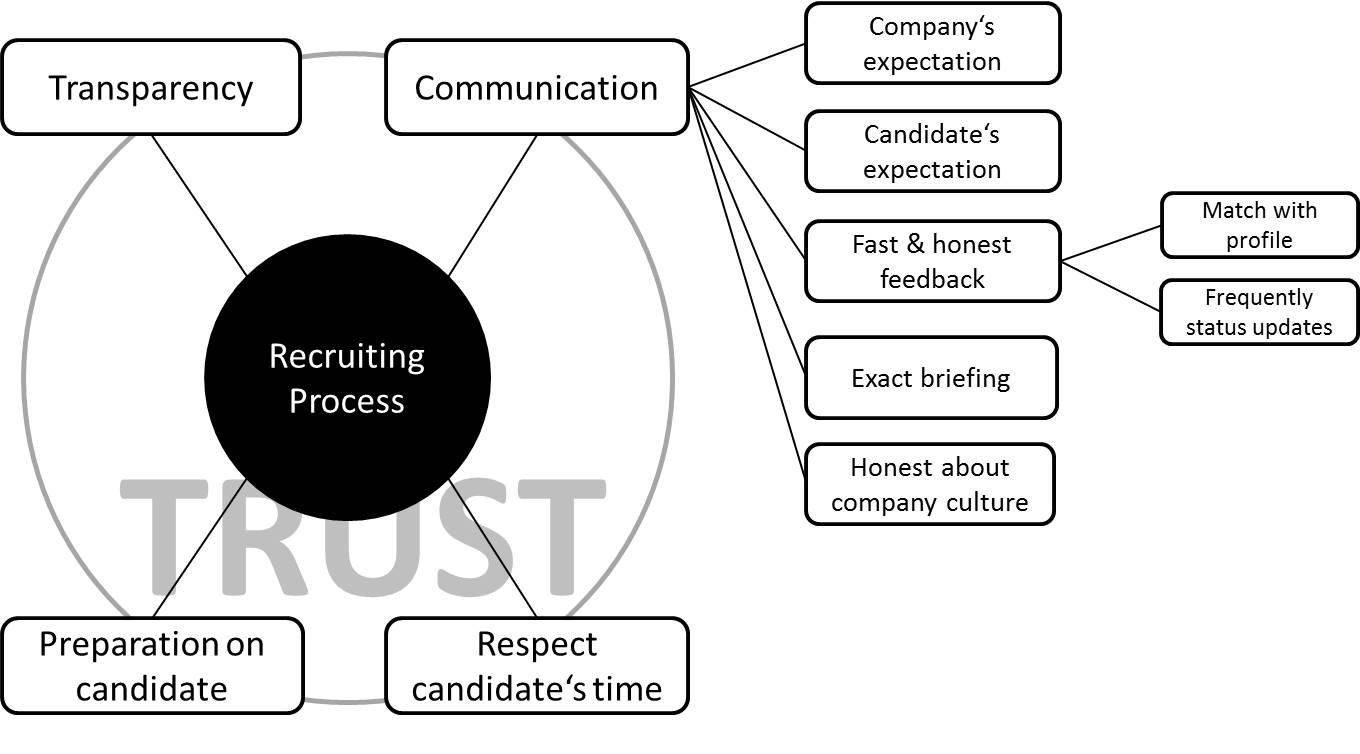Apply for Candidates!
Since nearly ten years we are talking about Web 2.0, Social Web and how new technologies have changed our daily live and business. Today we face four digital mega trends that are catalysts of change: mobile internet usage, cloud computing, social communication and analytics / big data (Source: PWC, Gartner). Product management and development paradigms have massively evolved into an agile, dynamic and user and customer centric approach. Organization forms of companies are getting leaner and smarter to be able to act, react and execute in a much more competitive and dynamic market environment. If the implementation of “change” is successful and sustainable the positive effects are visible in mostly all parts of a company, no matter if marketing department, service or sales team. How about the recruitment department? In the last twelve month I talked to candidates and companies, but also to friends and colleagues in semi-structured interviews about their experience with “active sourcing” and companies’ recruiting processes.
Strictly speaking active sourcing is not a new concept. External recruiting-consultants have been sourcing actively for potential candidates since more than 60 years, but mostly focused on executive search. So what is new since Web 2.0 emerged? Professional social networks, blogs and other online communities make it easy for “everybody” to search for talents online. Many employees show skills and professional experience in their social profiles as a kind of reduced resume or release knowledge related articles in personal blogs and special interest communities. So active sourcing is not a tool only to search candidates for executive positions anymore, but for any role that is hard to fill. This is in line with expectations of potential candidates as 40% would prefer “to be found” instead to search themselves for a job (source: Recruiting Trends 2014). The passive job hunter is on the rise.
So, it is easy to search for candidates in the web. The flipside of this coin is a low average quality of how candidates are contacted. In some cases recruiters send superficial personalized messages on LinkedIn (or Xing in Germany) that sound like a kind of bulk mails with job offers. Often candidates seem to be selected by a few fitting keywords without accurate research on current job title, skills, education or career level. This is a very impersonal and superficial active sourcing approach and it creates a negative perception on the candidate site. Some other recruiters contact candidates directly via phone without sending an email or message before – obviously with the principle “give it a try”. It seems to be faster to make three minutes a cold call instead of reading five minutes more carefully the profile or to search for additional information about the candidate on blogs or a personal website. Those that act here as “recruiters” are of course not always experienced professionals. In some cases even students or interns without any recruitment experience make the first contact.
As a scientific research recently found out recruiters spend an average of six seconds to scan a resume and to decide if a candidate fits or not. Recruiters self-reported they would spend four to five minutes per resume (source: TheLadders).
Even at executive search it is obviously not always common to be well prepared before talking to potential candidates. More than 40% of targeted candidates reported that they felt the recruiters were not well prepared in the interviews (referring to an interview stage after agreement on a general interest from both sides). Although those candidates were contacted by the recruiter they found themselves after reflecting some interest already in a one-sided applicant position. Today we have a candidate market in many industries. An application process needs to be bilateral. Companies (and also recruiters) have to understand that they must apply for a candidate too.
What are the most important requirements candidates expect from recruiters?
I collected and structured the following items from candidates:
- Transparency about the recruiting process & timing
- Clear Communication & Feedback
- Communicating the right expectations
- Listening to the candidate’s expectation
- Fast and honest feedback
- About fit from the recruiter even before direct company contact
- 1-2 working days after a direct interview with the company (even if it is just a status update, no decision)
- Clear briefing before first company contact
- Honest reflection of company’s situation and culture
- Well prepared recruiters beyond reading a candidate’s resume
- Respect for the time invest of a candidate
So transparency and communication are most important to set the right expectations and build trust. Without feedback there is no base for trust. It was often reported by candidates that after reaching a specific stage such as being presented from the recruiter to the company or having the first interview with the company, there was no feedback at all. In some cases it took weeks, in some months and in some cases the candidate never heard anything again from the recruiter. Of course that is the worst case. But after a candidate invested time in a recruiting process, it is naturally that he expects this his time invest is respected. And to get at least a short feedback about the main reasons for rejection is a fair expectation.
TO BE CONTINUED….

